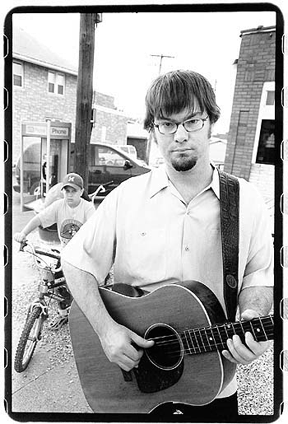Return of the Desolation Angel
Jay Farrar is Catching On
By Kevin Wilson

Jay Farrar strums along
Jay Farrar admits that if he had continued his formal education, he would likely have been a student of American History. He appears to adhere to a sort of historical method that is melodic in character. In his songs, he offers a backward half-look over his shoulder at the likes of Buffalo Springfield, the Flying Burrito Brothers, Bob Dylan and the Carter family. Through a fusion of memory and inspiration, Farrar's songs provide a common ground to piece together the past and the future of American Music.
Jay Farrar's own past is legendary. As an adolescent, Farrar began playing 1960s style garage music with his family. Farrar was still quite young when he met Mike Heidorn and Jeff Tweedy. Together they formed what was to become a band of considerable eminence, Uncle Tupelo.
Farrar readily admits that Uncle Tupelo was not the first rock and roll band to be fascinated by the world of acoustic music. They simply happened to re-integrate these worlds at a perfect time and became de facto representatives of "traditional" music in America.
The title of Uncle Tupelo's debut record, No Depression, was appropriated to describe the entire genre of music that emerged in the 1990s as an alternative to mainstream country and rock. What is truly important about this album is that it provided an MTV generation with a glimpse of America's cultural heritage that was largely forgotten and too often overlooked.
Though they remained relatively obscure throughout their career, Uncle Tupelo's popularity increased markedly with each recording and they became favorites on college campuses from coast to coast. Still Feel Gone and March 16-20 (which was produced by Peter Buck of REM) further established the band's credibility.
Uncle Tupelo was subsequently invited to participate in rather high-profile projects. They recorded a song with Michelle Shocked for her Arkansas Traveler album, a re-invention of standard American Folk songs. They made a contribution to Conmemorativo: A Tribute to Gram Parsons. Also, the popular sampler No Alternative featured Uncle Tupelo belting out John Fogerty's "Effigy."
By the time Anodyne was issued in 1993, Heidorn had long since left the band and the rest of Uncle Tupelo was falling apart. They had, as Farrar puts it, "run out of gas" after recording their major label debut. After a popular club tour to say farewell, Uncle Tupelo was put to rest in 1994. Farrar went on to form Son Volt. The rest of the Uncle Tupelo line-up from the Anodyne sessions featured musicians who would later play in Wilco, Golden Smog, Swag, and Lexington's own Damn Rathers.
Son Volt was created in the months following Uncle Tupelo's demise. Jay Farrar was collecting a new batch of songs. To record them, he recruited Jim and Dave Boquist and reconnected with Mike Heidorn. This band afforded Farrar the opportunity to continue making records free of any expectations or karma associated with Uncle Tupelo. The results were both creative and dynamic.
To date, Son Volt has released three records. Their style is, like Farrar himself, traditional and innovative at the same time. Each of these albums feature ambitious arrangements that float around Farrar's lyrics ultimately finding their own proper rhythm. Trace, Straightaways, and Wide Swing Tremelo all earned Farrar and company critical acclaim but little commercial success. Farrar pays little attention to what he calls "a subjective scene" that "hypes, glorifies, destroys, chews and spits" with relentless rapidity. Despite discouraging sales, Son Volt has endured with dignity and assurance.
Currently, Son Volt is on hold while Farrar indulges in solo projects. He recently contributed a song to the Skip Spence tribute album, More Oar before recording the full length record, Sebastopol.
With Sebastopol, Jay Farrar demonstrates that although he likes to rock, he is still capable of a quiet, focused gaze. Sebastopol features an all-star supporting cast of Farrar's friends, including Kelly Joe Phelps, Steven Drodze of the Flaming Lips, David Rawlings, and Gillian Welch.
Jay Farrar is a man in his mid-30s who has had a gratifying career thus far and is clearly a part of the American History he once aspired to study.
Jay Farrar appears at Lynagh's Friday November 9th at 9:30. Tickets are $12. Expect a sparse performance, but a large crowd.